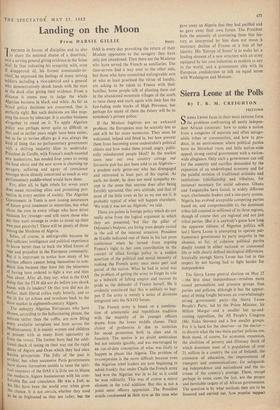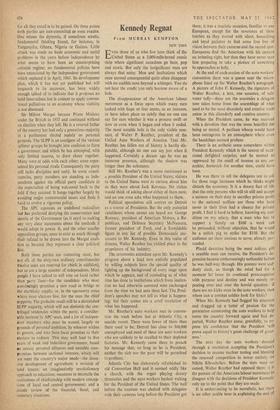Sierra Leone at the Polls
By T. R. M. CREIGHTON FREETOWN
C IERRA LEONE faces in their most extreme form 1.3 the problems confronting all newly indepen- dent African countries: how to make a nation from a congeries of separate and often antago- nistic tribes or communities; and how to pro- duce, in an environment where political parties have no historical roots and little nation-wide appeal, strong central government with a nation- wide allegiance. Only such a government can call for the austerity and sacrifice demanded by the expansion of an undeveloped economy and for the painful revision of traditional attitudes and institutions (chieftainship and tribalism, for instance) necessary for social advance. Ghana and Tanganyika have found, in widely different ways, charismatic leaders and a one-party system. Nigeria has evolved acceptable competing parties based on, and comprehensible to, the dominant tribes (all counted in millions) of its three regions, though of course they are regional and not just tribal parties. (But it is anybody's guess how long the apparent tidiness of Nigerian politics will last.) Sierra Leone is attempting to operate par- liamentary government by party majority in the absence, so far, of cohesive political parties deeply rooted in either national or communal life or with clearly defined ideological differences. Ironically enough Sierra Leone has lost in this respect by not having had to fight harder for independence.
The Sierra Leone general election on May 25 —the first since independence—revolves more round personalities and pressure groups than parties and policies, although it has the appear- ance of being fought between an overwhelmingly strong government party—the Sierra Leone People's Party, led by the Prime Minister, Sir Milton Margai—and a smaller but up-and- coming opposition, the All People's Congress (Mr. Siaka Stevens) and a few smaller groups. For it is hard for the observer—or the elector— to discern what the two main parties' policies are, Both stand, of course, for economic expansion, the abolition of poverty and illiteracy (both of which dominate most of 'a population of over 21 million in a country the size of Ireland), the extension of education, the improvement of transport and communications; for safeguard- ing independence and nationhood and the in- crease of the country's prestige. These, except perhaps in some, cases the last, are the proper and inevitable targets of all African governments. The question is by what methods they are to be financed and carried out, how popular support for all they entail is to be gained. On these points both parties are non-committal or even evasive. One misses the dynamic, if sometimes erratic, fundamental thinking found, for instance, in Tanganyika, Ghana, Nigeria or Guinea. Little attack was made on basic economic and social problems in the years before independence by what seems to have been an unenterprising colonial regime; no fundamental policies have been enunciated by the independent government which replaced it in April, 1961. Its development plan, which it has not yet published but will bequeath to its successor, has been widely enough talked of to indicate that it proposes no bold innovations but is content to apply conven- tional palliatives to an economy whose viability is not discussed.
Sir Milton Margai became Prime Minister under the British in 1957 and continued without an election when they left. He is a revered father of the country but had only a precarious majority in a parliament elected mainly on personal grounds. The SLPP is an amalgam of the various splinter groups he brought into coalition to form a government and which he has attempted, with only limited success, to draw closer together. Many were at odds with each other; some repre- sented his personal rivals. Consequently the party still lacks discipline and unity. In some consti- tuencies, party members are standing as inde- pendents against the official party candidate in the expectation of being welcomed back to the fold if they succeed. It hangs together largely by avoiding major controversial issues and finds it hard to evolve a vigorous policy.
The APC espouses an undefined radicalism but has preferred decrying the conservatism and inertia of the Government (as it says) to making any very clear statements about the methods it would adopt in power. It, and the other smaller opposition groups, seem to exist as much through their refusal to be drawn into the Margai coali- tion as because they represent a clear political line.
Both these parties are contesting most, but not all, of the sixty-two ordinary constituencies (twelve seats are reserved for chiefs in addition), but so are a large number of independents. Most people I have talked to will vote on local rather than party lines—for the candidate who most convincingly promises a new road or bridge or the electricity supply; or, in the upcountry areas where most electors live, for the man the chief supports. The probable result will be a diminished SLPP majority, which will not diminish the cen- trifugal tendencies within the party, a consider- able increase in APC seats, and a lot of indepen- dent members who must be wooed, largely on grounds of personal ambition, by whoever wishes to govern, and who have local promises to their electors to redeem. This may well lead to five years of weak and indecisive government, based vn uneasy personal alliances and unstable com- promises between sectional interests, which will lot meet the country's major needs—the inten- sive development of agriculture; a revision of land tenure; an imaginatively revolutionary approach to education; measures to reconcile the institutions of chieftainship with modern concep- tions of local and central government; and a drastic review of the financial, fiscal, and monetary situations.







































 Previous page
Previous page